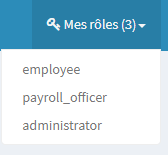I cannot reproduce this. Can you share more code, for example where do you impersonate other user? Can you provide a minimal example consisting of a route:
Route::get('test', function() {
// Some relevant code
return view('test');
});and the test.blade.php view?
With normal user i get: When i am impersonnating a user i get:
When i am impersonnating a user i get:
